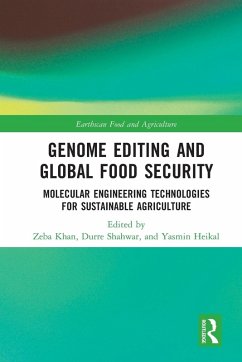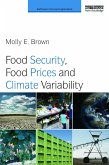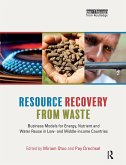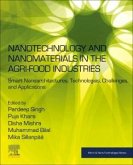Genome Editing and Global Food Security
Molecular Engineering Technologies for Sustainable Agriculture
Herausgeber: Khan, Zeba; Heikal, Yasmin; Shahwar, Durre
Genome Editing and Global Food Security
Molecular Engineering Technologies for Sustainable Agriculture
Herausgeber: Khan, Zeba; Heikal, Yasmin; Shahwar, Durre
- Broschiertes Buch
- Merkliste
- Auf die Merkliste
- Bewerten Bewerten
- Teilen
- Produkt teilen
- Produkterinnerung
- Produkterinnerung
With the rapid increase in the global population and changing climatic impacts on agriculture, this book demonstrates how genome editing will be an indispensable technique to overcome ongoing and prospective agricultural challenges.
Andere Kunden interessierten sich auch für
![Rivers and Society Rivers and Society]() Rivers and Society54,99 €
Rivers and Society54,99 €![Food Security, Food Prices and Climate Variability Food Security, Food Prices and Climate Variability]() Molly BrownFood Security, Food Prices and Climate Variability66,99 €
Molly BrownFood Security, Food Prices and Climate Variability66,99 €![Resource Recovery from Waste Resource Recovery from Waste]() Resource Recovery from Waste82,99 €
Resource Recovery from Waste82,99 €![Effective Risk Communication Effective Risk Communication]() Effective Risk Communication69,99 €
Effective Risk Communication69,99 €![Valuing U.S. National Parks and Programs Valuing U.S. National Parks and Programs]() Linda J BilmesValuing U.S. National Parks and Programs50,99 €
Linda J BilmesValuing U.S. National Parks and Programs50,99 €![Nanotechnology and Nanomaterials in the Agri-Food Industries Nanotechnology and Nanomaterials in the Agri-Food Industries]() Nanotechnology and Nanomaterials in the Agri-Food Industries210,99 €
Nanotechnology and Nanomaterials in the Agri-Food Industries210,99 €![Conserving Europe's Wildlife Conserving Europe's Wildlife]() Andrew L R JacksonConserving Europe's Wildlife53,99 €
Andrew L R JacksonConserving Europe's Wildlife53,99 €-
-
-
With the rapid increase in the global population and changing climatic impacts on agriculture, this book demonstrates how genome editing will be an indispensable technique to overcome ongoing and prospective agricultural challenges.
Produktdetails
- Produktdetails
- Verlag: Taylor & Francis Ltd (Sales)
- Seitenzahl: 318
- Erscheinungstermin: 18. Dezember 2024
- Englisch
- Abmessung: 234mm x 156mm x 18mm
- Gewicht: 467g
- ISBN-13: 9781032465265
- ISBN-10: 1032465263
- Artikelnr.: 72104692
- Herstellerkennzeichnung
- Libri GmbH
- Europaallee 1
- 36244 Bad Hersfeld
- gpsr@libri.de
- Verlag: Taylor & Francis Ltd (Sales)
- Seitenzahl: 318
- Erscheinungstermin: 18. Dezember 2024
- Englisch
- Abmessung: 234mm x 156mm x 18mm
- Gewicht: 467g
- ISBN-13: 9781032465265
- ISBN-10: 1032465263
- Artikelnr.: 72104692
- Herstellerkennzeichnung
- Libri GmbH
- Europaallee 1
- 36244 Bad Hersfeld
- gpsr@libri.de
Zeba Khan is a faculty member at the Center for Agricultural Education, Department of Agricultural Sciences at the Aligarh Muslim University, India. She holds a PhD from Aligarh Muslim University. Durre Shahwar is a post-doctoral fellow at the Department of horticultural biosciences, Pusan National University, South Korea. She holds a PhD from the Aligarh Muslim University, India. Yasmin Heikal is an assistant professor in the Department of Botany at Mansoura University, Egypt. She holds a PhD in genetic diversity from Mansoura University.
Chapter 1 Genome editing in plants via CRISPR/Cas9: A genomic scissor
borrowed from bacterial immune system.
Chapter 2 Genome Editing by Site-Directed Nucleases (SDNs) and its
Applications Producing Climate Change Resilient Crop Plants
Chapter 3 Genome editing by different Site-Specific Nucleases (SSNs) and
their applications in improving horticultural crops
Chapter 4 Precision genome engineering and designer nucleases for crop
improvement
Chapter 5 CRISPR genome editing to address food security and climate
changes: challenges and opportunities
Chapter 6 Abiotic and biotic stress tolerance in plants via genome editing
tools
Chapter 7 Recent advances in Genome Editing towards Sustainable Agriculture
Chapter 8 Potential of commercialization of genome edited crops
Chapter 9 Crop Genome Editing - Regulations and Policies
Chapter 10 Biosafety and biosecurity concerns associated with plant genome
editing
Chapter 11 Role of Bioinformatics Databases in Functional Genomics and
Metabolic engineeringResearches
borrowed from bacterial immune system.
Chapter 2 Genome Editing by Site-Directed Nucleases (SDNs) and its
Applications Producing Climate Change Resilient Crop Plants
Chapter 3 Genome editing by different Site-Specific Nucleases (SSNs) and
their applications in improving horticultural crops
Chapter 4 Precision genome engineering and designer nucleases for crop
improvement
Chapter 5 CRISPR genome editing to address food security and climate
changes: challenges and opportunities
Chapter 6 Abiotic and biotic stress tolerance in plants via genome editing
tools
Chapter 7 Recent advances in Genome Editing towards Sustainable Agriculture
Chapter 8 Potential of commercialization of genome edited crops
Chapter 9 Crop Genome Editing - Regulations and Policies
Chapter 10 Biosafety and biosecurity concerns associated with plant genome
editing
Chapter 11 Role of Bioinformatics Databases in Functional Genomics and
Metabolic engineeringResearches
Chapter 1 Genome editing in plants via CRISPR/Cas9: A genomic scissor
borrowed from bacterial immune system.
Chapter 2 Genome Editing by Site-Directed Nucleases (SDNs) and its
Applications Producing Climate Change Resilient Crop Plants
Chapter 3 Genome editing by different Site-Specific Nucleases (SSNs) and
their applications in improving horticultural crops
Chapter 4 Precision genome engineering and designer nucleases for crop
improvement
Chapter 5 CRISPR genome editing to address food security and climate
changes: challenges and opportunities
Chapter 6 Abiotic and biotic stress tolerance in plants via genome editing
tools
Chapter 7 Recent advances in Genome Editing towards Sustainable Agriculture
Chapter 8 Potential of commercialization of genome edited crops
Chapter 9 Crop Genome Editing - Regulations and Policies
Chapter 10 Biosafety and biosecurity concerns associated with plant genome
editing
Chapter 11 Role of Bioinformatics Databases in Functional Genomics and
Metabolic engineeringResearches
borrowed from bacterial immune system.
Chapter 2 Genome Editing by Site-Directed Nucleases (SDNs) and its
Applications Producing Climate Change Resilient Crop Plants
Chapter 3 Genome editing by different Site-Specific Nucleases (SSNs) and
their applications in improving horticultural crops
Chapter 4 Precision genome engineering and designer nucleases for crop
improvement
Chapter 5 CRISPR genome editing to address food security and climate
changes: challenges and opportunities
Chapter 6 Abiotic and biotic stress tolerance in plants via genome editing
tools
Chapter 7 Recent advances in Genome Editing towards Sustainable Agriculture
Chapter 8 Potential of commercialization of genome edited crops
Chapter 9 Crop Genome Editing - Regulations and Policies
Chapter 10 Biosafety and biosecurity concerns associated with plant genome
editing
Chapter 11 Role of Bioinformatics Databases in Functional Genomics and
Metabolic engineeringResearches









